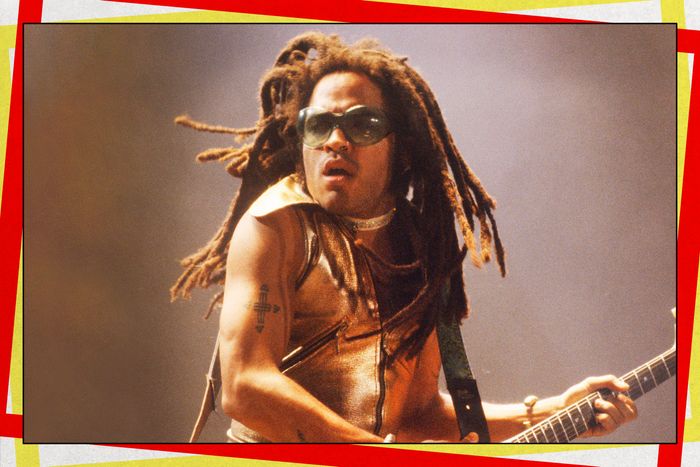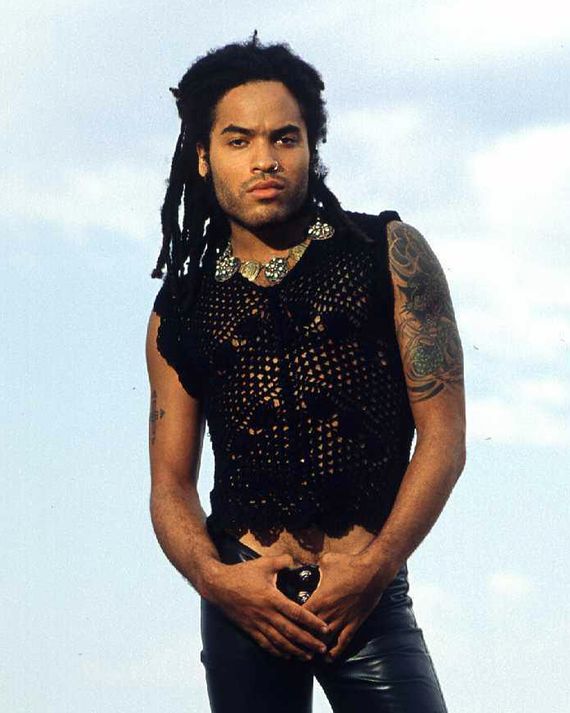
Lenny Kravitz is “just waking up” at his Bahamas home on a recent morning when we say hello. Our conversation begins in a living room, but — no, hang on — him, his mint tea, and his open-chested denim vest would rather relocate to the porch. (The leather gym pants seemingly have the day off.) His corneas are, of course, cocooned in sunglasses. Kravitz is savoring these little moments of calm in his “sacred space” before the release of his new album, Blue Electric Light, which will be out on May 24 and supported by an international tour. “It’s a brand-new start for me,” the guitar hero says. “I can just feel it. It’s like pushing the restart button on Lenny 2.0.”
This Kravitz is a little funkier, even bordering on the New Wave. If you’ve come seeking another “Are You Gonna Go My Way,” kudos for your great taste, but that was an old iOS LK update. At nearly 60 years old, Kravitz realized his personal evolution continues to align with reimagining what rock and roll can be. Anything reminiscent of the past just isn’t going to cut it, although he made a career-spanning exception for our “Superlatives” column. Besides, he has some misconceptions that he’d like to clear up.
Most therapeutic song to record
“A Long and Sad Goodbye.” It’s about my dad. I started writing it before he died. The song really dealt with the difficulty that we had. We had a very challenging relationship, and a lot of that was not only based on our dynamic together — as two human beings, father and son, but also a lot of those dynamics were based on the heartbreak that he caused my mother. Me being a mama’s boy, I was very sensitive to it. That song was the most therapeutic because it just has a lot of heaviness surrounding it. I chose to release it after he passed because I didn’t want it to hurt him. Well, it wasn’t done in a harmful manner, but I just chose to respect his feelings. So it came out afterwards and it was good for me. I’ve never performed the song live. Maybe one day.
Song that scared you most to write
Nothing. I always feel good about what I’m writing because, ultimately, I don’t really have a choice in the matter. I just accept it. I’m an antenna. I pick up what I hear and what’s being offered to me. It’s floating around there somewhere. I learned very early on, while working on my first album, to accept what comes. Because I play all the instruments, arrange, and produce, my job is to get what I’m hearing to sound in the studio like what it sounds like in my head. But I never think to myself, Oh, this is too much, or This is diving too deep, or I don’t want to say this. My ideas, my ego, and my sensibility have nothing to do with it. I’ve thought to myself at times, Oh, this is the song I’m being given. Okay, wow, this is kind of weird. I didn’t think I’d be writing a song with this groove. But it makes it where, in the end, I can be free because it’s not about me. It’s about this thing that I’m being given and my job is to complete it.
It all started with the Let Love Rule album. Before that, I was searching, as one does: “What’s my sound? What do I like? What do I want to put together? Oh, this would be cool. I’ll put this kind of vibe together with that.” I was consciously trying. I was working with other people, and all of a sudden, I got these songs from Let Love Rule. They started coming at me and downloading into my head. I started to listen to it and ran over to the instruments to figure it out. Then another one came, and then another one after that. They came without me trying or without me thinking about it. So from that time to now, I’ve accepted that’s how I work. I do what I hear, and there’s a wonderful feeling in accepting that. This is for me. I’m not following trends. I’m not following what people think you should follow, and I’m not even following what I think I should follow. I’ve learned to stay as far out of the way as possible and enjoy it. Then I know I’m doing the right thing.
Most overindulgent song
There’s a song called “I Built This Garden for Us” on Let Love Rule. It’s got drums, bass, guitars, strings, a Wurlitzer organ, cellos, and lots of vocals. It doesn’t sound “overindulging” per se, but it’s got a lot of shit going on at one time, just banging all over the place. It somehow reads and it works, but I’ll admit it’s got a lot going on. I was writing the song about me, Zoë’s mom, and Zoë, about this utopian sort of paradise that we were going to live in — and were already living in at the time.
Song where you found your voice
That’s a hard question because my voice and my way of singing has evolved. I think I’m a better singer than I was at the start of my career. Not that I’m not raw now, because I still am, but there’s a certain rawness at the beginning that when I listen back I go, “Wow, I don’t quite sing like that anymore.” But I accept it. So I’d have to say “Let Love Rule.” That wasn’t the first song I recorded. Some of the first songs were “Fear,” “Rosemary,” and “Does Anybody Out There Even Care.” “Let Love Rule” came toward the end of that album. It was something that came to me when I was living in Soho. I was on 450 Broome, on the corner of Mercer, when I made that record. I’d written “Let Love Rule” on the wall, next to the elevator, so that people would see it coming and going from the apartment. Of course, I would also see it all the time. I never thought about writing a song with those words. Then one day I walked in the apartment, looked at it again, went and picked up a guitar, and it just came. I thought it was just a nice phrase. When I did that song, it was the beginning of me accepting my voice. That was the first time I had heard myself and went, “Okay, that’s me.” My tone, the way I sing the song, and my three-part harmonies on the choruses. I grew up singing in a boys’ choir, so I love those layered harmonies.
My voice just kept getting more seasoned. I’m now able to sing cleaner, but I still have the rawness and the feeling. Perhaps I’m more nimble with my voice. It’s gotten clearer, even, which it’s normally the other way around with singers — normally you start out clear, then you get more rough, as a lot of people do. So that’s interesting to me. Why am I the opposite? Also, I had never planned on being the front man or being the lead singer. I was always playing the guitar, bass, keyboard, or drums in a band. I never planned on doing this. After I’d gotten out of the boys’ choir, when I was about 15 years old up until my early 20s, when I had the first record, I never thought about singing on a professional level.
Guitar solo that defines your career
There’s a song on Are You Gonna Go My Way called “Black Girl,” where there’s a really simple solo. It’s not just about “simplicity” in the basic sense, but rather getting all the emotion you need out of the least amount of notes. I love that solo for that reason. There’s also a tad of Jimi Hendrix and Curtis Mayfield in there. When you think about the blues or the simplicity of when you listen to B.B. King, or any of the greats, a simple chord structure with the least amount of notes is able to pull out all of the emotion. I created the “It Ain’t Over ’Til It’s Over” solo to be very, very simple with that in mind. The chords are basic, but the best songs in pop, R&B, and rock history are pretty simple in essence — but there’s a lot of complexity within the simplicity.
Album that doubled as your biggest creative rejuvenation
Blue Electric Light. I wanted fresh energy, new energy, and youthful energy, because youth isn’t only an age. Youth is also a feeling and a place to be. I’ve never been older than I am today, sure, but I’ve never felt younger than I feel today, which is an interesting place to be. I think that feeling of youth also has to deal with freedom. Earlier in my life, as free as I may have been in my music, I may not have been as free in my life, or in my mind, or in my spirit. Now I’m at a place within myself where I’ve never been more free, which then releases this aura and feeling of youth, freshness, and vibrancy.
It started a few years ago, but the process took a minute. I got a tattoo that says “free at last,” inspired by Martin Luther King. It was a conscious decision to get there, even though it says “free at last,” it was the beginning. That could have been, like, ten years ago? It took time. As you live and move forward, you realize, “Well, I thought I was free then.” Hopefully you continue to move forward and get better, whatever that means to you. I just made a decision that I needed to become more and more free as time went on. I can say that right now, today, I’m feeling that very strongly. Hopefully in five years’ time, I’ll feel even better about it. It’s the journey.
Most prevailing myth about your career
I think a lot of people don’t realize that I write it all, produce it all, and play it all. I still meet people and when they find this out, they say, “Oh, wow, you play all the instruments? Really?” And I go, “Yeah, for 35 years.” A lot of people that enjoy music aren’t necessarily into the liner notes. So maybe that’s it — they don’t understand what I’m doing and the process of how I do it. And that’s okay. You can enjoy the music. You don’t have to know.
Netted shirt with the most sentimental value



I have one that belonged to my dad. In the ’70s, there was an abundance of netted shirts. He had this little blue netted shirt — very tight-knit — with red piping on the collar and at the end of the short sleeves. You could still see little dots of his skin underneath it. So that started the whole thing. Actually, I never thought about that, but that’s where it started.
More From The superlative Series
- The Coolest and Craziest of TLC, According to Chilli
- Kim Deal on Her Coolest and Most Vulnerable Music
- Cyndi Lauper on the Freest and Most Provocative Music of Her Career


